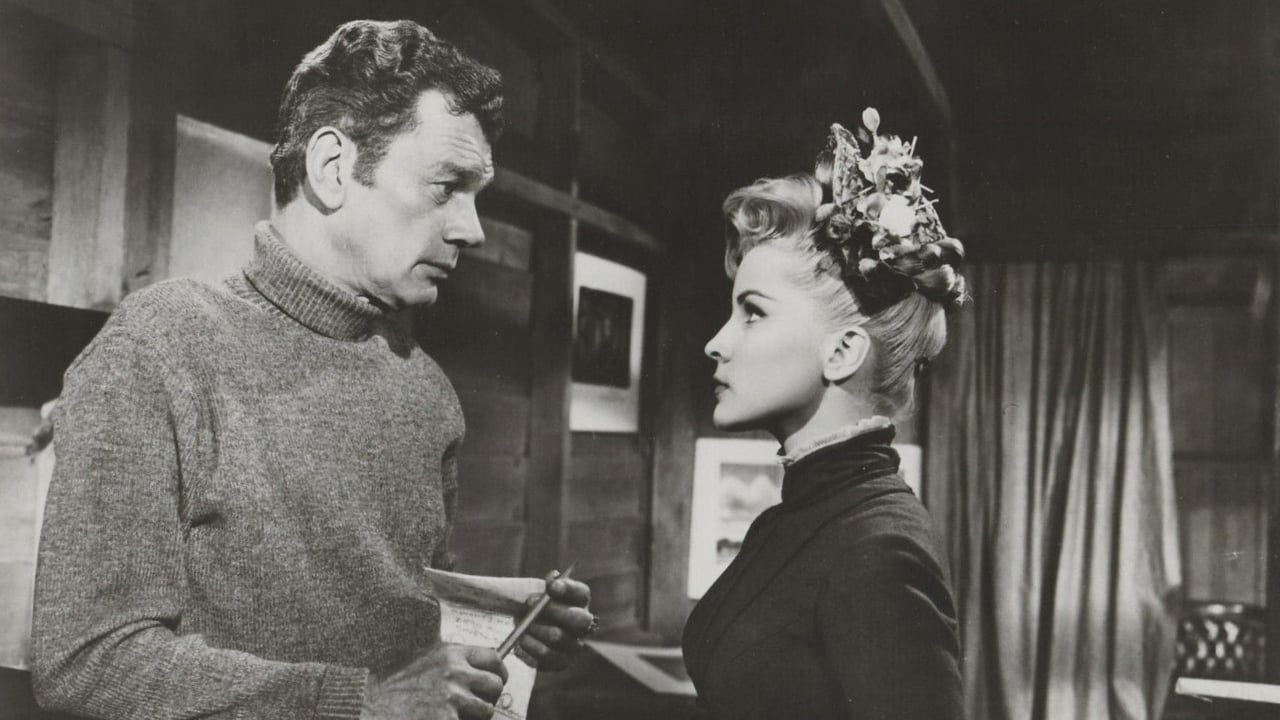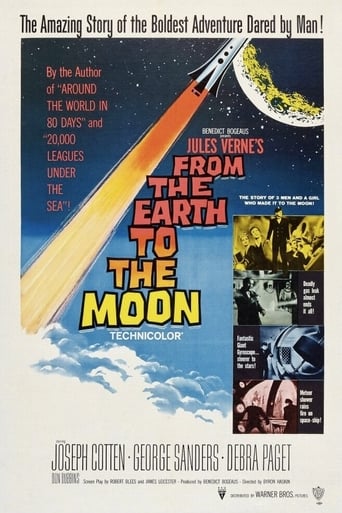Kattiera Nana
I think this is a new genre that they're all sort of working their way through it and haven't got all the kinks worked out yet but it's a genre that works for me.
Hellen
I like the storyline of this show,it attract me so much
Lucybespro
It is a performances centric movie
MoPoshy
Absolutely brilliant
Russell Campbell
I guess this contains spoilers, but only about one plot issue and some special effects. Pretty bad special effects (some not so bad, some awful). During the meteor storm, they show a meteor coming at them that looks like a perfectly round metal sphere that they punched holes all over in a perfectly symmetrical pattern and then placed sparklers in the holes. Kind of like a big golf ball with sparklers sticking out of each dimple. Not even close to what a meteor would look like, especially with the uniform pattern they applied. And they deal with the rapid acceleration problem when fired from the cannon - at least they try to - by having three spinning tubes and some special gas to protect them. This really wouldn't protect them, but at least they (or Verne) gave it a shot, but then don't address how the stowaway survives the launch. I wouldn't bother with this flick.
wes-connors
In 1868, following the War Between the States, American inventor Joseph Cotten (as Victor Barbicane) announces his explosive "Power X" will be tested as he sends a manned rocket-ship to Earth's Moon. Joining Mr. Cotten on the trip is skeptical, but Bible-believing George Sanders (as Stuyvesant Nicholl). Stowing away is Mr. Sanders' pretty daughter Debra Paget (as Virginia). She provides a romantic interest for the fourth traveler, Cotten's young assistant Don Dubbins (as Ben Sharpe). Originally an exciting novel by Jules Verne, "From the Earth to the Moon" was started at the disintegrating RKO studio and ended up released by Warner Bros. Perhaps unsure about the ultimate fate of the project, everyone seems a little bored - and it's contagious.**** From the Earth to the Moon (11/26/58) Byron Haskin ~ Joseph Cotten, George Sanders, Debra Paget, Don Dubbins
jimdex
This appears to be an incredibly cheap Italian production. The script is terrible and makes very little sense. The photography is mediocre at best. The sound is simply awful, especially the eerie Theramin music. Cast of tens in the crowd scenes. Joseph Cotten tries a little but George Sanders just mails his role in. You can't blame him because the dialog is often beyond bad. Debra Paget is beautiful and that's all. Don Dubbin is so bad that it's no wonder he disappeared from the screen. It's so laughable, it would make a good episode on Mystery Science Theater 3000. Especially the multi-story space capsule/cannonball that's like a small house inside. If nothing else is on TV, go outside and look at the real moon.
aimless-46
This 1959 movie adaptation of Jules Verne's "From the Earth to the Moon" is the graveyard of declining actors. Joseph Cotton and George Sanders were at the end of fairly successful film careers and about to be relegated to guest appearances on a variety of television shows; the most notable being Sander's Mr. Freeze on "Batman". Debra Paget was in her late twenties; she had lost her glow and was used up by Hollywood standards. The change to an unflattering "strawberry" blonde look exacerbated the problem as few actresses have ever been less suited to a light hair color. On the plus side, the movie itself is a fairly accurate adaptation of Verne's story; at least the book's illustrations appear to have been used as models for the rocket and the cannon. Verne's 19th century take on space travel turned out to be more accurate than most of the speculation during the first half of the 20th century. The adaptation's biggest problem was altering Verne's story by inserting a topical theme about the post WWII arms race. In Verne's 1865 novel, the Baltimore Gun Club itself set about building a rocket to go to the Moon. In the adaptation a munitions manufacturer (think "Destination Moon") concocts the scheme to demonstrate his powerful new explosive. With a lot of discussion about science, weapons, and peace the movie dances around the subject extensively yet never makes a coherent point about its position (regarding the nuclear arms race), as if simply inserting the theme is somehow sufficient. The movie is a cross between "Destination Moon" and "Rocketship X-M", combining the former's good science and bad political message with the latter's dismal sets and comical special effects. The acting in all three films is equally sad. The premise has munitions manufacturer Victor Barbicane (Cotton) discovering an explosive (Power X) capable of firing a shell-like projectile to the moon. His plan is opposed for philosophical/religious reasons by Stuyvesant Nicholl (Sanders), another manufacturer. Although these philosophical differences play an important part in the story, they are never convincingly elaborated on, which undermines the basic storyline. President Grant orders Barbicane to abandon the project because it is considered an act of war by other nations. While this is unconvincing it does serve as Barbicane's inspiration to change the project to a manned space flight. Nicholl then agrees to manufacture the ceramic coating needed for re-entry and to accompany Barbicane on a flight to the moon. Paget plays Nicholl's daughter who hides inside the rocket just prior to take-off. "From the Earth to the Moon" is often confused with "First Men in the Moon" which was made five years later. Probably because both are set in the 19th century and both feature a female stowaway (played by Martha Hyer in the later film). "First Men in the Moon" (while not a great film) is superior in virtually every detail to "From the Earth to the Moon". Rather ironically it was adapted from a story by "H.G. Wells", an early science fiction writer often compared to Verne. Movie adaptations of Verne's books were a big thing in the 1950's and early 1960's. Among the good ones were "20,000 Leagues Under the Sea" (1954), "Around the World in 80 Days" (1956), "Journey to the Center of the Earth"(1959), "Mysterious Island" (1961), and "Master of the World" (1961). Unfortunately "From the Earth to the Moon" is simply not in the same league as these examples. Then again, what do I know? I'm only a child.

